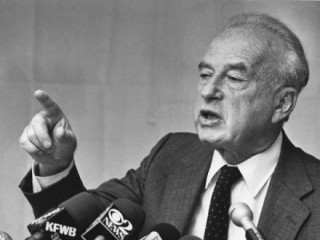
Yitzhak Rabin biography
Date of birth : 1922-03-01
Date of death : 1995-11-04
Birthplace : Jerusalem, Palestine
Nationality : Israelian
Category : Politics
Last modified : 2011-09-21
Credited as : statesman, former prime minister of Israel, Nobel Peace Prize
0 votes so far
In 1994, Rabin won the Nobel Peace Prize together with Shimon Peres and Yasser Arafat. He was assassinated by right-wing Israeli radical Yigal Amir, who was opposed to Rabin's signing of the Oslo Accords. Rabin was the first native-born prime minister of Israel, the only prime minister to be assassinated and the second to die in office after Levi Eshkol.
His military career began in 1940 when he joined the "Palmach", the elite unit of the Haganah. During the War of Independence (1948-1949), he commanded the Harel Brigade, deployed on the Jerusalem front. For the next 20 years, he served with the IDF as O.C. Northern Command (1956-1959); as Chief of Operations and Deputy Chief of Staff (1959-1964) and as Chief of Staff (1964-1968), commanding the IDF during the Six-Day War.
On January 1, 1968, he retired from military service and shortly afterwards was appointed ambassador to the United States. During his years as ambassador in Washington, he promoted and consolidated the ties between the two countries.
In the spring of 1973, Rabin returned to Israel and became active in the Labour Party. He was elected Member of the Knesset in December 1973 and when Golda Meir formed her government in April 1974, was appointed Minister of Labour.
On June 2, 1974, the Knesset expressed confidence in a new government headed by Prime Minister Yitzhak Rabin.
During Rabin's premiership, the government placed special emphasis on strengthening the economy, solving social problems and reinforcing the IDF.
With American mediation, disengagement agreements were signed with Egypt and Syria (1974), followed by an interim agreement with Egypt in 1975. Later in 1975, the first Memorandum of Understanding was signed between the governments of Israel and the United States.
In June 1976, Rabin's government issued the order for "Operation Entebbe", liberating the hijacked Air France passengers.
Following the May 1977 elections, and until the formation of the National Unity Government in September 1984, Rabin served as a Knesset Member of the Labour Party in opposition and was a member of the Foreign Affairs and Defense Committee.
In the National Unity Governments (1984-1990), Rabin served as Minister of Defense. In January 1985, he presented the proposal for the withdrawal of IDF forces from Lebanon and the establishment of a security zone to guarantee peace to the settlements along Israel's northern border.
Yitzhak Rabin was elected chairman of the Israel Labour Party in its first nationwide primaries conducted in February 1992 and led the party to victory in the June 1992 Knesset elections.
In July 1992, Rabin formed Israel's 25th government and became its 11th Prime Minister and Minister of Defense, and acting Minister of Religious Affairs and Labour and Social Affairs.
Rabin's biographical book, "Service Notebook", was published in 1979 and was translated into English and French.
His book on Lebanon, written after Operation "Peace for Galilee", was published in 1983.
Assassinated by right-wing Israeli extremist Yigal Amir.
IDF Chief of Staff starting 1962, including the Six Days War.
Awards and honors:
Prime Minister of Israel Jun-1992 to 4-Nov-1995 (assassination)
Israeli Minister Defense, Sep-1984 to Mar-1990
Prime Minister of Israel 2-Jun-1974 to Apr-1977
Israeli Ambassador Feb-1968 until 1973, to the United States
Israeli Knesset
Nobel Peace Prize 10-Dec-1994 (with Shimon Peres and Yasser Arafat)
Shot Tel Aviv, Israel (4-Nov-1995)
















